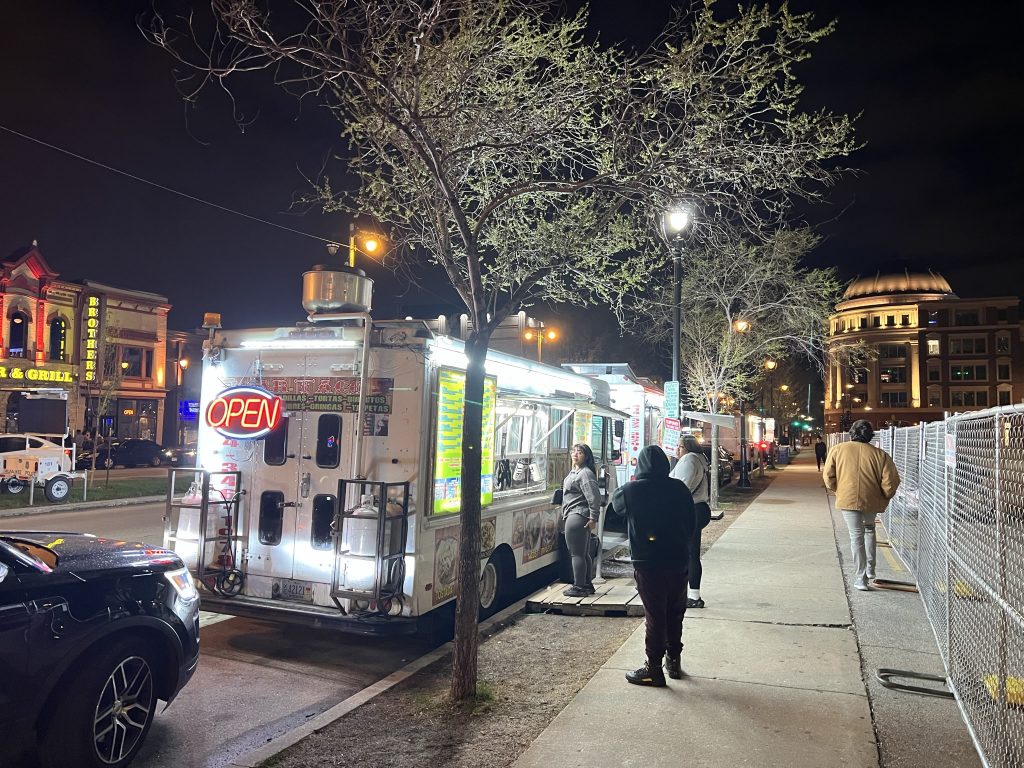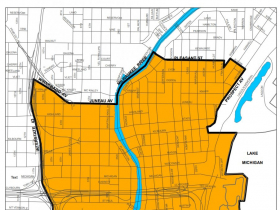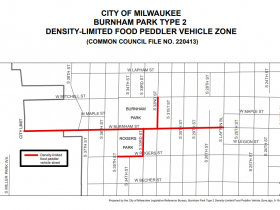Food Trucks Face New Restrictions
Proposal includes downtown time limit and ban on operating within 50 feet of a restaurant.
Calling it “pro-food truck and pro-community,” Common Council members JoCasta Zamarripa and Jonathan Brostoff have crafted a proposal to overhaul the city’s food truck regulations that received its first public review Tuesday.
The proposal includes major changes for how and when food trucks operate Downtown, near Burnham Park, on W. Lincoln Ave. and near restaurants.
Feedback on the proposal, accrued over nearly two hours of debate and public testimony before the Licenses Committee on Tuesday, was mostly positive. But the leader of a coalition of 17 taco trucks and one operator have concerns with specific aspects of the proposal, and an outside group is threatening legal action.
Zamarripa and Brostoff said something needs to be done given the growing number of issues from bad operators and an expanding number of food trucks.
“We have had an influx of food trucks in Milwaukee since the pandemic,” said Zamarripa. She said that the number of operators in the city has doubled since 2014, prompting new issues. Brostoff previously cited concerns on N. Water St. with a growing amount of litter, improperly dumped grease, public urination and customers using others’ parked vehicles as tables. Others at today’s meeting cited concerns with crowds and pedestrian safety from food trucks blocking sight lines and bus stops.
Zamarripa and Brostoff’s predecessors were among those that used the council’s decade-long practice of simply banning food trucks from entire blocks to address any issue.
“Implementing a ban never sat well with me,” said Zamarripa. But she said her constituents living near Burnham Park “implored” her to do something about the growing number of food trucks parking on W. Burnham St. just east of S. 35th St.
After what she said were several conversations with food truck operators, residents and council members, Zamarripa and Brostoff have a plan to create two new restricted zone types and new citywide regulations.
“It has been a heavy lift,” said Zamarripa. “Now I know why not many alders have wanted to touch this issue.”
Downtown would be subject to a Type 1 zone that would restrict food trucks to operating only until 1 a.m. (instead of 3 a.m. citywide) and not for more than six hours at a time in the zone. W. Burnham St. would be subject to a Type 2 density restriction that limits the number of food trucks and awards operators access to specific spots on a seniority basis. Additional areas could be designated as either zone type.
Citywide, food trucks would be prohibited from within 50 feet of a restaurant that doesn’t have a drive-thru.
The proposed ordinance would also require all food truck operators to provide a waste basket and pick up litter, not dump any liquid waste and comply with the city’s nuisance ordinance. Fines for noncompliance would be increased tenfold from a range of $5-$50 to $50-$500, but license fees would not increase.
“The long and short of it is we want to move away from the system we had before this legislation, which is when problems arise ban it and push it to somewhere else or do nothing,” said Brostoff. “Ultimately, we want to grow our entrepreneurial class and make sure it’s open for everyone.”
Five food truck operators on W. Burnham St. endorsed Zamarripa’s proposal and thanked her for consulting them. JC King’s Tortas owner Jahir Arias said there is currently an “overpopulation” of trucks in the area and safety is a concern for operators and residents alike. Two area residents also endorsed the proposal and said they didn’t want to see an outright ban.
Lowlands Group CEO Eric Wagner, whose office is on N. Water St. and which has restaurants across the city, endorsed the proposal and said issues are growing near his business, including litter, grease spills and illegal parking that blocks his employees from leaving in their vehicles. He said the issues were caused by both customers and operators.
A handful of other downtown bar and restsaurant owners also endorsed the proposal, including Bobby Wiltgen, Jack Roman, Michael Vitucci and Matt Schmidt.
“I love it, and I think it’s a great start,” said Roman. But, like several other brick-and-mortar operators, he said he supported extending the 50-foot restaurant prohibition. Brostoff said other cities had a 200-foot restriction, but he didn’t want Milwaukee to be overly restrictive.
VISIT Milwaukee, Milwaukee Downtown, Business Improvement District #21 and the Wisconsin Restaurant Association also endorsed the proposal.
Mayor Cavalier Johnson supports the proposal and will sign it, said policy director Claire Zautke. Zamarripa said the mayor wanted a citywide closing time of 1 a.m. but compromised on the time-based zone. Johnson had pushed to relocate food trucks away from the Water Street bar district after several shootings involving large crowds occurred in 2021 and 2022.
Opposition to Proposal
Walter Garron leads a coalition of 17 taco truck owners, Taco and Food Trucks Unidos, and said they weren’t consulted before the Water Street temporary ban, sparking frustration. He expressed reservations about the latest proposal, including that it would favor politically-connected operators.
Unlike when the temporary ban was put into place, he said his group was able to meet with Brostoff this time. But the meeting “didn’t go so well.” He accused the alderman of being unable to produce specific complaints or citations. “We are hopeful that we can work out something,” he said.
Garron, who also leads Brown Berets Wisconsin, said those promoting Downtown are hiding something. “It seems that they do want people here, as long as it’s not people of color and not late at night,” he said.
Regarding Burnham Park, he said pedestrian safety concerns are overblown. “The problem is a lot of people are jaywalking,” said Garron.
The Fatty Patty operator Abdullah Ismail spoke in favor of regulating bad actors, but said he opposes how early the time restriction goes into effect. “I would like to extend it,” he said. Ismail said his food truck, commonly on Water Street near the bar district, earns as much between 12 a.m. and 2 a.m. as it does in the seven-hour window between 5 p.m. and 12 a.m. He cited several logistical issues concerning the proposal to have trucks move at least once every six hours.
Ismail also has concerns about the expectations that food trucks can regulate their patrons after giving them their food. He said he cleans up the area around his truck and offers a waste basket, but can’t do that 50 feet away. “We cannot control people who eat and throw the garbage,” said Ismail.
Before the meeting, the Wisconsin Institute for Law and Liberty issued a statement opposing the proposal. It said the framework would create new regulations on small businesses, unfairly restricts hours of operation and threatened legal action. “The ordinance also creates the opportunity for special carve outs for the politically connected,” said WILL deputy counsel Lucas Vebber.
Other Changes And What’s Next?
In addition to the expiration of the Water Street ban, the proposal would eliminate another restriction: a ban on food trucks on W. Lincoln Ave. Zamarripa said she didn’t think the restriction was necessary anymore.
The alderwoman said other bans would be reviewed as part of the annual review process included in the proposal.
“It will probably change over time as we try to perfect it,” said committee chair Alderwoman Milele A. Coggs, who said she requested the annual review process.
“If we start working on the proposal now, we can continually improve the process going forward,” said Brostoff.
Ald. Mark Chambers, Jr. said he hoped to see downtown restaurants extend their kitchen hours if food trucks had to leave at 1 a.m. (or 1:30 a.m. on weekends). “We won’t want to promote drunk driving or anything like that,” said the alderman.
The legislation would close one loophole. “All food trucks that operate in the city of Milwaukee will be required to get their license from us,” said Zamarripa. Currently, a food truck can be licensed and inspected in another city or by the state and operate in Milwaukee. The new proposal would require, at minimum, a mobile seller’s license from the City of Milwaukee, but would still allow the food trucks to be inspected in other cities or by the state. “That was kind of a weird loophole we found out through this work,” said Brostoff.
One provision has been removed since the legislation was unveiled last week. A prohibition on creating a “light nuisance” is now included as only a suggested future item. Zamarripa said the Department of Neighborhood Services does not currently have the capacity to enforce a prohibition on the bright LED lights that wrap a number of trucks. “It was just not logistically possible this time around,” said Brostoff, shaking his head. The proposal calls for city departments to find a way to implement light and noise restrictions by May 2024.
The Licenses Committee unanimously endorsed the proposal and referred it to the Public Safety & Health Committee. The health committee is scheduled to discuss the proposal on Thursday at 9 a.m.
The full council could review the proposal on May 31.
Type 1 and Type 2 Zone Maps
Legislation Link - Urban Milwaukee members see direct links to legislation mentioned in this article. Join today
If you think stories like this are important, become a member of Urban Milwaukee and help support real, independent journalism. Plus you get some cool added benefits.
More about the Food Truck regulatory framework
- City Hall: Proposal Would Allow Food Trucks To Return To W. Capitol Drive - Jeramey Jannene - Mar 29th, 2024
- Burnham Park Food Truck Zone Unveiled - Sophie Bolich - Aug 9th, 2023
- Food Trucks Banned On Portion of W. Silver Spring Drive - Jeramey Jannene - Jul 31st, 2023
- City Hall: New Food Truck Restrictions Approved - Jeramey Jannene - May 31st, 2023
- City Hall: Food Trucks Face New Restrictions - Jeramey Jannene - May 16th, 2023
- City Hall: New Proposal Would Regulate When, Where And How Food Trucks Operate - Jeramey Jannene - May 11th, 2023
- City Hall: Council Bans Food Trucks Along Four Blocks of Water Street - Jeramey Jannene - Apr 18th, 2023
- City Hall: Food Truck Ban for Downer Ave. Proposed - Jeramey Jannene - Jul 20th, 2020
- Taco Truck Issue Still Not Settled - Edgar Mendez - May 6th, 2019
- City Hall: Food Truck Truce Reached - Jeramey Jannene - Mar 26th, 2019
Read more about Food Truck regulatory framework here
Political Contributions Tracker
Displaying political contributions between people mentioned in this story. Learn more.
- July 25, 2019 - JoCasta Zamarripa received $100 from Claire Zautke
- June 24, 2019 - JoCasta Zamarripa received $100 from Claire Zautke
- October 25, 2015 - Cavalier Johnson received $50 from Claire Zautke
City Hall
-
Council Blocked In Fight To Oversee Top City Officials
 Dec 16th, 2025 by Jeramey Jannene
Dec 16th, 2025 by Jeramey Jannene
-
Latest Effort to Adopt New Milwaukee Flag Going Nowhere
 Dec 3rd, 2025 by Jeramey Jannene
Dec 3rd, 2025 by Jeramey Jannene
-
After Deadly May Fire, Milwaukee Adds New Safety Requirements
 Dec 2nd, 2025 by Jeramey Jannene
Dec 2nd, 2025 by Jeramey Jannene























